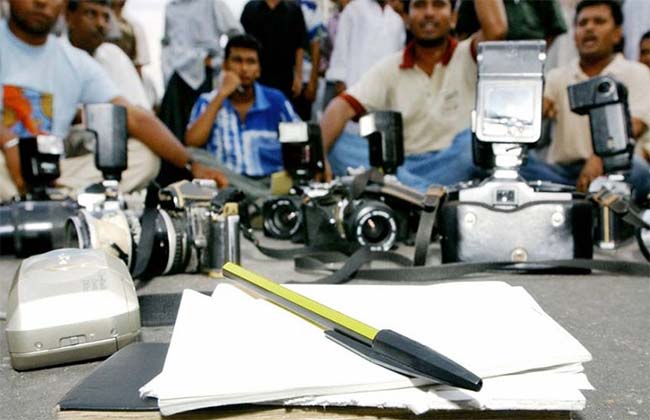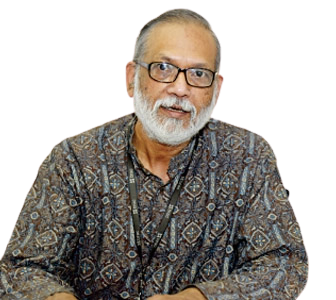
That Bangladesh lacks press freedom is no secret. That all developed countries do is no secret either barring a few maybe. That all rich countries show greater levels of press freedom is also a fact. That such wealth making was/is largely based on exploitation of the poorer countries is now admitted. But the link between freedom of press and wealth of nations is rarely discussed. Repeating the phrase has not led to more free press anywhere.

Why there should be more press freedom in different parts of the world should also be asked. Why we also continue to depend on Western institutions to tell us if we are doing well or bad is also a matter of interest. By doing so, we are letting ourselves be judged by the standards of the West of which we are not a part. It’s not a small matter as it shows that the notion of freedom or lack of it is still not our own but borrowed from Western narratives.
This is not to say that we are living in a world of free press but that we still depend on organizations of the West to tell us that we are not free or free.
Is there a universal model of free press?
The concept of universal notion of free press is a product of the cold war. It was being insisted upon by the West that the world was split between the “free” and the “non-free” world. It was the capitalist West that was free and the socialist world that wasn’t so. It became an iconic slogan that turned into a war cry. Of course, the world also had problems of freedom but the economics of freedom was never really looked into making “freedom” a tool to produce “perfect” –read Western”- politics. That was how the concept of a global aspiration for free media was established.
In this construction, “freedom of press” became so sacrosanct that nobody asked if the Western project itself was sufficiently ethical or not. Thus we have a situation where the notions of freedom produced by the Western project to win the cold war have become the global aspiration for many in the developing world who suffered most at global hands.
Yet it’s now that many issues of freedom have emerged which are challenging the “freedoms” of the West. It’s true that political freedom was touted but it’s not recognized that the western world had deliberately sidestepped much of the issues of lack of social and economic freedoms in their own societies. Two sectors are clearly observable.
Race and Gender
Firstly, the Western world completely ignored the issue of diversity and media policy making was extremely discriminatory and mostly racist. It was and still largely is a White people’s world and the ethnic and race minorities were completely ignored and even trashed. It was a product of the mentality of the next generation of slave owners and colonizers, worshipping the very persons whose ideas and principles were abhorrent now to the entire world.
The other area was that of male privilege. Women were invisible in the media world and their issue was totally ignored. Western free world without any coercion sold the stereotypical “Woman”, a bonded labour of the household as the ultimate goal to be achieved by all women.
Resistance against such issues within western media is very high now and will continue to be so because Western media liked to pontificate against the rest while keeping its own house and society un- free. They were all for freedom in various parts of the world but never bothered to clean up their own act at home, within their own household and media system either. Justice and freedom was supposed to be for others as western media was already free. That is why almost all Western sources generated notions of freedom are inherently lacking in integrity and no longer carry any moral authority anywhere except in so-called civil societies of the post-colonial world.
Challenging the Western notion
But for such a challenge to happen, the rest of the world needs to define what they see as freedom of press and what its purpose in providing such information is. In Bangladesh we are very aware of the Digital Security Act but this affects only a small number of people. It’s more of a bad law mostly used to bully, harass and get even with the enemy. Most of its application is outside professional media. To use this example as the biggest part of reality is actually not useful media.
Nor can media be exclusively traditional media with the advent of social media. DSA is far more applied there and that is why the relevance of professional media is itself in question. The freedom and its lack is not the act of the authorities only but the owners, advertisers, trade unions, and many other lobbies active in it. Freedom is also measured along political lines only as the West would like to and socio-economic spaces are left alone. The measuring of freedom therefore has to be interpreted along priorities of different people and groups and it’s only then can we ourselves claim to be free.
In the end the contest between the older western ideas and the emerging ideas of freedom, prosperity and media is what such observations present. As everywhere, the sun tilts in one place and the dawn rises in another. Bangladesh needs to define through research what it means by media/press freedom before jumping to the table repeating Western judgments’. That age is over for universal notions of Western ideas.
Afsan Chowdhury is a journalist, columnist and liberation war researcher. He received Bangla Academy Award in 2018 for his contribution to the liberation war literature.
